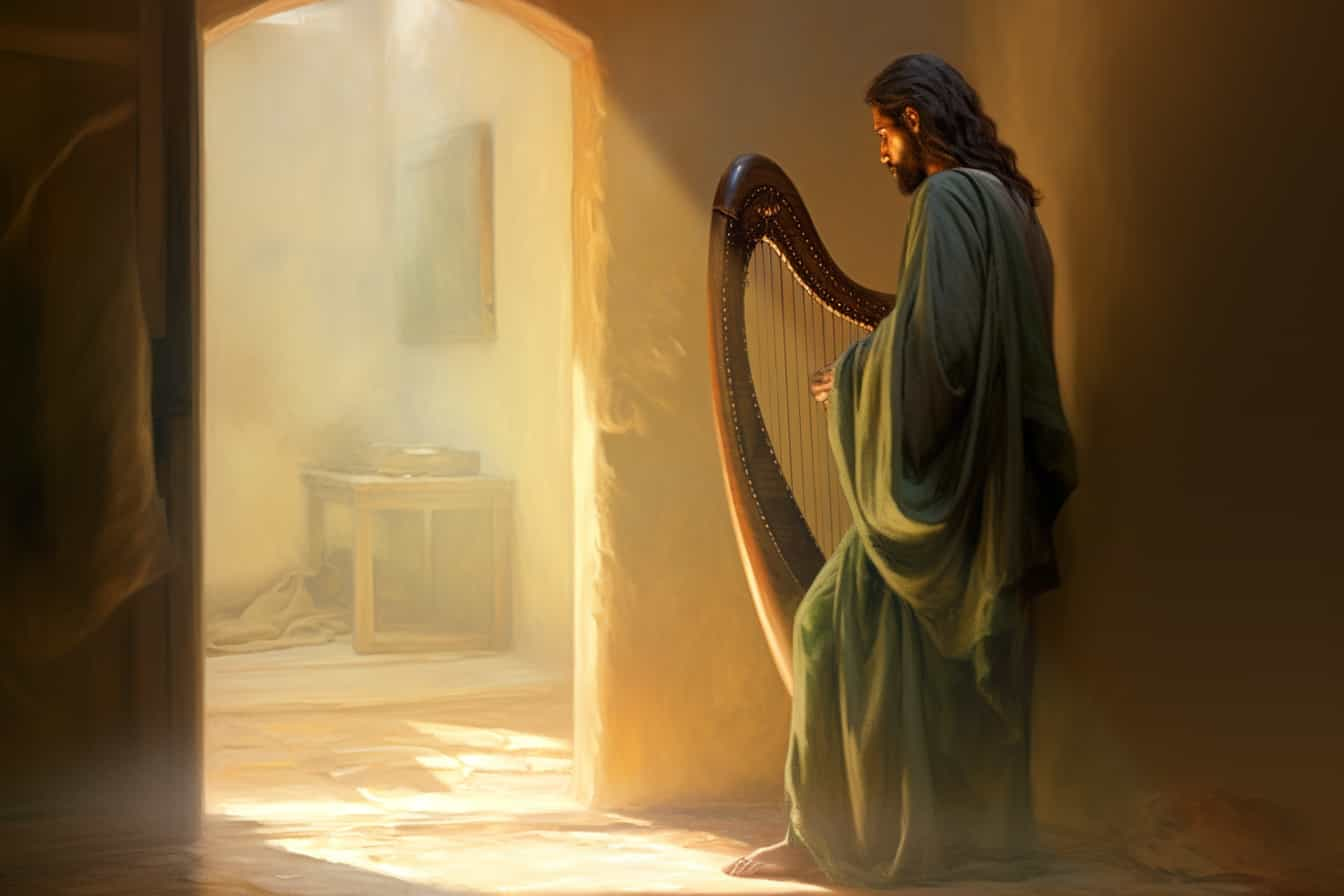Discover Jesus \ Topic \Jesus' Harp
Tag
Jesus' Harp
Jesus' passion for music, particularly his proficiency in playing the harp, brought joy to those around him. He sold his harp to pay for his brother's education, reflecting his deep care for family, making his experiences relatable and humanizing his legacy.

Table of Contents
Summary
Jesus had a deep love for music, especially playing the harp. Little known to the modern world, Jesus became a skilled harpist by age eleven and enjoyed entertaining his family, friends, and neighbors with his beautiful music during the evenings, especially in the winter months. Jesus also promoted an interest in vocal music among his friends. Music was a way for Jesus to express himself and bring joy to others.
When he was fifteen years old, a tax collector threatened to confiscate his harp to extract additional revenue. In Jesus' nineteenth year, he sold his harp to secure the funds to send his brother Jude to school. This was a willing sacrifice Jesus made to care for his father Joseph's family. But the loss of the harp took away a source of joy and comfort that Jesus cherished during his mortal life. Even so, Jesus found solace in other ways. In later years he would often go to a hill he loved as a child and reminisce about his childhood days in Nazareth. These memories helped him find strength and prepared him for the challenges that were ahead.
Jesus' love for music and his skill with the harp were a part of his life and this can make him feel closer and more accessible, reminding us that he lived a life filled with many of the same passions and pleasures that enrich our own experiences during our lives.
Jesus' Love for Music
When Jesus was seven years old, he learned to milk the family cow and care for the other animals. During his eighth year, he arranged to exchange dairy products for lessons on the harp. He had a distinctive fondness for all things related to music. Later, he also made efforts to cultivate a passion for vocal music among his young companions.
At the age of eleven, Jesus had already developed exceptional skills as a harpist and took great joy in entertaining his family and friends with his remarkable interpretations and skilled improvisations. By the time he was fourteen years old, it became customary for the neighbors to visit during the winter months and listen to Jesus play the harp, as well as to enjoy his captivating storytelling skills and his readings from the Greek scriptures.
While his father Joseph was still alive, there were funds for Jesus to continue his lessons on the harp. After Joseph died when Jesus was fourteen, there were no longer funds to do so. Jesus was responsible for providing for the family, and he worked long hours. When he was tired and weary, he played the harp to relieve tension and quiet his mind. It provided comfort for him during the time he experienced such grief and sorrow following the loss of his father and concern for the welfare of his family.
The Tax Collector's Threat
After Joseph's death, the family funds were dramatically reduced, and although Jesus hoped that a sum of money would be forthcoming for Joseph's work after his tragic death, Herod Antipas refused to pay what was owed to Joseph. As time passed, all of the family savings and resources had been diminished with only Jesus working. While Joseph lived and worked as a contractor, the family had prospered and he had invested wisely, but now properties were sold one by one to keep the family going until some of Jesus' brothers completed school and reached the age where they could work and contribute.
Jesus' earnings alone made it difficult to pay the synagogue tithes, not to mention the civil taxes owed. When Jesus was just fifteen years old, the tax collector threatened to take his harp as part of the money owed, but he was able to hold on to it.
During his nineteenth year, Jesus' brother Jude reached school age and Jesus decided to sell his harp to gain the funds to cover the expenses required to send his brother to school. Jesus knew he would greatly miss playing his harp, but he comforted himself in knowing that his harp would not fall into the hands of the tax collector.
"Jesus' Harp" - by Midjourney and Gary Tonge
Lessons and Insights
While Jesus may had to give up his harp, his true mastery and inspiration came from his teachings, his compassion, and his unwavering faith in God. His inner strength would always shine through, even during seasons of hardship and disappointment, and losing the ability to play his harp was one of those unavoidable disappointments in Jesus' life. Yet, for a brief time, he enjoyed exploring this creative talent for the benefit of those around him.
While we can contemplate his miracles, teachings, and mission on earth, we can also appreciate the human Jesus who took joy in creative, artistic, and purely recreational pleasures. His engagement with music makes him more relatable, reminding us that he had many of the same passions and pleasures we do. It highlights his appreciation for beauty and creativity and allows us to find a more personal connection to him and his amazing life on our planet.
Suggested Reading from this Essay

Timeline
Related Topics
Importance of the Early Home Life
A loving home shapes character, values, and future.
Hobbies and Interests Jesus Enjoyed
Jesus loved nature and enjoyed music, art, and storytelling.
Contributors
Susan Lyon, Roland Siegfried, Mike Robinson, Gary Tonge
